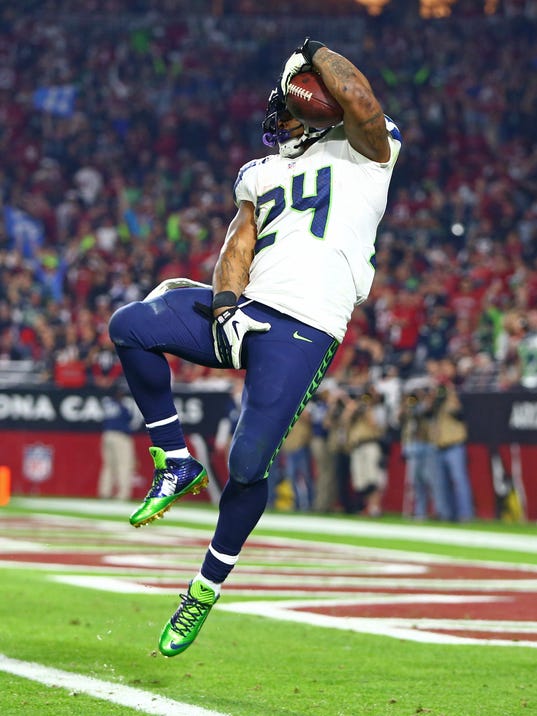Of course an event with this much viewership wouldn't be without some celebrity endorsement. The music industry gave us Katy Perry to headline the half-time show. Meanwhile, cinema superheroes Chris Pratt and Chris Evans used their respective Star-Lord and Captain America personas to bet on the game's outcome over social media (a playful ruse to advertise their charity work). Pierce Brosnan drove a Kia. And Liam Neeson even played Clash of Clans:
I love how this commercial uses Neeson's hard-boiled, revenge-seeking action persona to imply that playing Clash of Clans will make me a hard-boiled, revenge-seeking action star as well. Oh, and I relate to Neeson because he gets his name mispronounced at Starbucks too? What a bonus!
The use of star persona in advertising is one of the key themes in both the Dyer and Gledhill readings this week. Specifically, Gledhill points out that Bette Davis' persona as the "Independent Woman" helps to subvert patriarchal values and create a "matriarchal paradise" in Now, Voyager (1942) (page 147). Davis' strong persona helped characterize the film as a "woman's film," and thus made it more relatable to a female audience.
One must need not look hard for similar uses of persona when observing the Superbowl's football stars. One of the most interesting celebrity endorsements, in my video game-loving opinion, was the use of Seattle Seahawks Running Back Marshawn Lynch to advertise Mortal Kombat X, a controversial game notorious for extreme violence.
The crossover between video games and sports is quite obvious. Both have a sweet spot demographic of males 18-34 and are competitive mediums by nature. Mortal Kombat and NFL Football are both games after all. The interesting twist in the above Conan O'Brian segment is that the developers of Mortal Kombat X, NetherRealm Studios, show just how bloody and gross this game can get by showing Marshawn "Beast Mode" Lynch becoming visibly shocked by the violence. You know you have a delightfully gory game if a running back named "Beast Mode" can't handle it.
I think the segment is effective at selling the game because it takes advantage of the fact that Marshawn Lynch is what Dyer might call an "idol of consumption" (pg. 39). In a consumerist society, people define their personality by buying brands and goods that identify with their social interests. Often times popular stars can influence public tastes by aligning with certain products. For example, Eckert recalls Al Jolson pairing with Rinso, Jackie Oakie pairing with Camels, and Edward G. Robinson pairing with Kraft in the 1930s (page 37). Even today, Mortal Kombat is a hard sell to mainstream gamers because of its high blood quotient. The fact that Marshawn cringes at the violence, but still has fun with it, humanizes both him and Mortal Kombat.
And Lynch's persona sure did need humanizing:
Lynch's vocal approval of Mortal Kombat was probably the most that Seattle fans have heard Lynch speak as of late. In an attempt to avoid being fined up to $100, 000 for not showing up to after-game press interviews, Lynch has, well, actually showed up to press interviews. However, as shown in the above video, he tends to repeat the same phrase over and over again in response to every question. His ambivalence to sharing his thoughts on games threatens what Dyer might call his "ordinariness" (page 43). Is Lynch now so successful that he refuses to talk to ordinary people anymore? Or is this a clever way to be "anti-establishment" against abusive NFL regulations? In the latter case, perhaps his behavior would actually make him cooler in the eyes of his fans. Unfortunately his intentions are muddy and ambiguous.
I would argue that the Mortal Kombat video serves to actually build on the "anti-establishment" angle of Lynch's sports persona. While playing the game, he makes fun of himself and all of the fines he has received from missing interviews and making crotch-grabbing gestures.
By showing Lynch in a more light-hearted, playful environment, I actually connected with him more in the Mortal Kombat video. He showed humility in being fined, but shows a clear indifference to the ridiculous rules of the NFL. He also managed to make me laugh hysterically. The Conan segment is set up to imply that the atmosphere created by the Mortal Kombat game is what facilitated this humanizing social aura around Lynch. Kudos, NetherRealm Studios, I'm not even a football fan and you made me like Marshawn Lynch.
I'll take 8 copies of Mortal Kombat X, please.


No comments:
Post a Comment
Note: Only a member of this blog may post a comment.